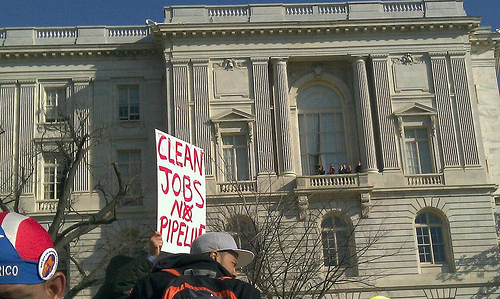The payroll tax cut extension deal, approved by the Senate 89-10 this morning, is being widely reported as including a requirement that the State Department act on the Keystone XL pipeline within 60 days. Talking Points Memo labels it a GOP win on Keystone, and Politico reports:Greens call out Keystone XL deal. However, David Dayen at Firedoglake – a site not normally known for reflexive defense of Democrats’ negotiating tactics – sees it differently: Republicans demand to kill the Keystone XL pipeline.
A careful analysis shows that the in all likelihood the deal will simply allow both sides to generate hot-button quotes come election 2012. At worst, it’s no more than Kabuki theater. At best, it gives President Obama a chance to affirm his commitment to environmental and climate issues, and reject the pipeline completely.
1. The deal: Congress can require the State Department to make a decision, but can’t tell the State Department what to decide.
Senator Richard Lugar (R-IN) is taking credit for a bill he introduced, S.1932, to be incorporated into the deal. The bill, as currently written, requires the State Department to make a decision on the pipeline within 60 days. The bill does not require the State Department to make any particular decision, yes or no, only that it make a decision within 60 days.
The State Department has already said that no arbitrary deadlines can be set for its decision:
“Should Congress impose an arbitrary deadline for the permit decision … the Department would be unable to make a determination to issue a permit for this project,” the Department said in a statement.
The State Department’s official statement reiterates an “early 2013” timetable.
Got that? The Senate deal requires the State Department to make a fast decision, and the State Department has already said that its fast decision would be a “no.” Tweets from @dpfeiffer44 emphasize:
How will the GOP explain to their members that their bill doesnt force the President to approve Keystone, it essentially kills it?
Lots of incorrect reporting out there today that says the House Payroll bill forces approval of the Keystone pipeline, that is not true
he House bill simply shortens the review process in a way that virtually guarantees that the pipeline will NOT be approved
Republicans presumably know all this – the State Department promised on December 12 to say no to an expedited decision on Keystone XL, and the payroll tax deal was made on December 16. So why go through this? Either they have faith in the caveats (discussed below), or they want the ability to score political points with voters more than they want the pipeline itself. In other words, they’re likely playing Kabuki theater, manufacturing an excuse to scream about the “job killing” Obama administration.
2. The caveats
First, Obama or the State Department could simply about-face: declare that enough information has been collected and approve the pipeline within 60 days. It wouldn’t be the first time the President has overruled his own agency’s recommendations on an environmental issue.
For what it’s worth, Ed Henry senses that the White House has already sustained whatever damage it would sustain from rejecting the pipeline, and is poised to turn it down:
sense i’m getting from WH — & i stress just a sense — POTUS leaning toward BLOCKING Keystone cause insiders think he already took hit
what i mean: WH thinks POTUS already took hit for allegedly “killing Keystone”/calculation is won’t be big deal to really kill it 60 days
In other words, the White House may have already made a political calculation that it could safely turn down the pipeline without damaging President Obama’s reelection campaign.
I’ve looked at a second caveat. The State Department’s original announcement of delay listed the factors it would weigh: “whether the proposed pipeline was in the national interest, considering all of the relevant issues together. Among the relevant issues that would be considered are environmental concerns (including climate change), energy security, economic impacts, and foreign policy.” Section 3 of Senator Lugar’s bill requires the President to either grant the pipeline permit if he determines that it’s in the national interest, or report to Congress why not, including “consideration of economic, employment, energy security, foreign policy, trade, and environmental factors.” That’s not quite the same list – Lugar adds employment and trade, and omits climate. Lugar’s bill might require approval. However, Lugar’s bill isn’t so different from the State Department factors; the employment aspect of Keystone XL is hotly disputed, and trade shouldn’t be a make-or-break point. In short, the language of S.1932 does not create a trap for unwary Democrats.
3. The advantages for Democrats
Why should Republicans get all the talking points? Democrats should use this episode to generate some Kabuki theater moments of their own. The GOP has risked a tax hike on millions of Americans just to prove, once again, that the party is owned lock, stock, and barrel by Big Oil. By contrast, President Obama will demonstrate to the world that he rejects dirty tar sands oil when he rejects the pipeline. Far from being a “cave” on the pipeline, the vote gives the President a chance to reject it entirely.



